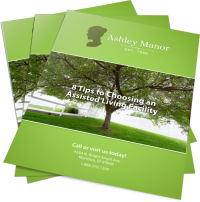As our parents get older, it becomes our responsibility to care for them. Ideally, we want them to remain in their own homes or living with the rest of the family, but there often comes a time when that’s no longer possible. While there’s no hard and fast rule to guide us toward making this decision, there are some indications to watch for that suggest that it may be time to consider assisted living alternatives.
Your Elder Loved One Needs More Intensive Care
This can often be the most obvious sign that a change is needed because it represents a more measurable change in your elder loved one’s condition. If the individual’s need for assistance escalates, this is a clear indication that a change in living conditions is needed. In cases where the elder parent develops dementia, their own welfare or the safety of others in the family may become an issue. By recognizing this situation early and contacting an assisted living facility, you can better help your elder loved one.
You’re Failing to Keep Up with Your Other Responsibilities
As your elder parent’s physical or mental condition deteriorates, they may need a greater amount of supervision. This can include assisting them with daily care and hygiene and just keeping someone around to ensure they don’t harm or injure themselves. While this isn’t a big physical burden, it can eat up a large portion of your time and your other responsibilities may suffer for it. Remember, that you may also have a career, spouse, children, and others that may also need your attention.
Your Elder Parent Takes to Wandering Off
This is a common symptom of dementia and other types of cognitive degeneration. Your elder parent may begin wandering around the property without telling anyone. Later, they may wander the neighborhood and go even farther, wandering throughout the city. When this becomes a problem, it’s time to consider more formal senior care to ensure your elder parent is supervised more regularly.
Sundowners Syndrome Worsens
This is a condition common in Alzheimer’s patients, which is marked by increased confusion in the evening hours. Elders with dementia become more agitated in the evening, due to increased activity in the household, feelings of fatigue, and lower light levels. The elder becomes agitated and it may become more difficult to calm the individual down. When this becomes a regular occurrence, an assisted living facility may be the best answer. A staffed facility, where Sundowner’s Syndrome is taken into account when planning daily activities, can alleviate feelings of confusion and agitation.
Your Own Emotional State is Compromised
Adding the care of an elder parent to your already busy schedule is bound to take a toll. It’s not uncommon to feel frustrated with the elder parent, simply because the situation is creating more of a burden than you expected. You may even lose your temper and snap at your elder parent, which will leave you feeling guilty. When this begins to happen frequently, it’s a sign that you’re just not equipped to handle the level of care that your elder loved one requires. A facility can offer a broad range of services to make your elder parent’s life happier and healthier.
It’s never easy to make the decision to relocate an elder parent or loved one to a senior care facility. When the time does come, it’s important to discuss the option with your elder loved one and to try to include them in the decision, if possible. This can help them make the transition more easily and ensure the move won’t leave them feeling depressed or abandoned.



Leave a Reply